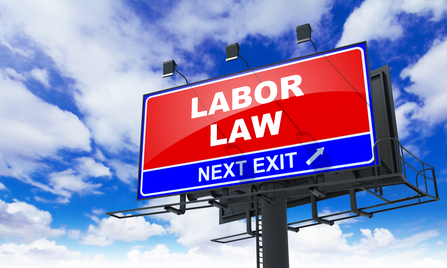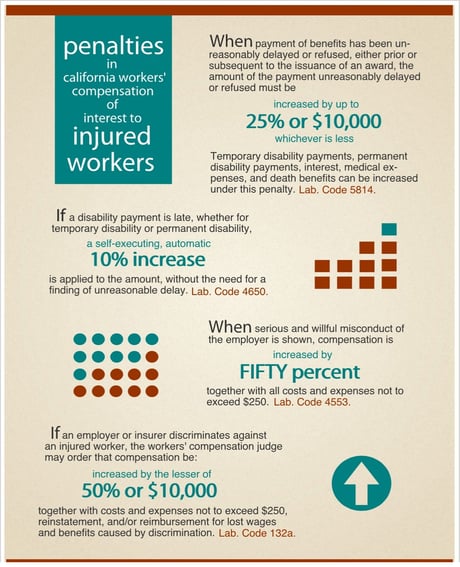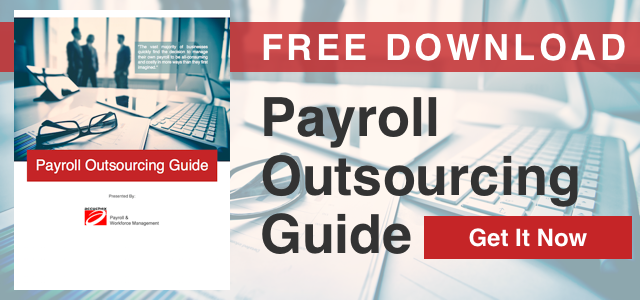 When it comes to labor law, California stringently prohibits discrimination against workers, who are injured on the job, by their employers and insurers. Section 132a of the California Labor Code prohibits certain acts by employers and insurers. In addition, employers can potentially be liable for acts not expressly stated in the statute.
When it comes to labor law, California stringently prohibits discrimination against workers, who are injured on the job, by their employers and insurers. Section 132a of the California Labor Code prohibits certain acts by employers and insurers. In addition, employers can potentially be liable for acts not expressly stated in the statute.
Labor Law: California Employers and Worker's Compensation
The remedies available to injured workers who have been discriminated against are significant, even though Section 132a claims can be difficult to prove. However, the bulk of legal resources available tend to support the employee, not the employers.
If you have an employee who has suffered a workplace injury it is important that you, as an employer, are clear as to exactly what you can and cannot do according to Section 132a. If an injured employee feels they have been discriminated against that individual has up to one year from the date of the alleged discriminatory act, or the date of their termination.
Worker's Compensation and Penalties for Employers
It is helpful to know what, exactly, you as an employer in California might do to open yourself to possible penalties under Labor Code Section 132a.
The law is written to clearly identify separate prohibited acts by employers and by insurers.
1. An employer expressly violates the statute if it discharges, threatens to discharge, or in any manner discriminates against any employee because the employee has:
- Filed or made known an intention to file a claim for compensation or an application for adjudication
- Received a rating, award, or settlement; or,
- Testified or made known an intention to testify in another employee’s case before the Workers’ Compensation Appeals Board (WCAB).
2. An insurer expressly violates the statute if it advises, directs, or threatens an employer, under penalty of cancellation or a raise in premium (or for any other reason), to discharge an employee because the employee has:
- Filed or made known an intention to file a claim for compensation or an application for adjudication
- Received a rating, award, or settlement; or,
- Testified or made known an intention to testify in another employee’s case before the WCAB.
Here is an infographic with a brief overview of employer penalties facing California employers:

(image courtesy of N.P. Seitz|Law)
The California Labor Code Goes Further in Employee Protection
As a result of the expressed prohibited acts under Section 132a, precedence has established that other certain acts by employers can also result in liability for discrimination. This can occur when an injured worker claims to have been penalized solely for suffering a workplace injury or for missing time from work as a result of their injury.The challenge for the employee is to adequately demonstrate employer discrimination under the statute. The employee must prove by a preponderance of the evidence that "detrimental" action was taken by the employer and that this action was a directly a result of the job-related injury. It's not enough for the employee to simply make an allegation - they must also show that the employer intentionally targeted them for because of their work injury.
Understand Labor Law, California Worker's Comp, and Employee Lawsuits
As an employer in California you already face a gamut of ever increasing and challenging labor laws. In addition to the rising cost of doing business, you must also navigate the rising possibility of being on the receiving end of an employee claim or allegation. Lawsuits, settlements and possible penalties not only can add immensely to your business costs, they can sometimes be catastrophic for a smaller business.
Staying abreast of the changes in the labor law, California and federal, is an absolute must for any business owner, HR professional and company operating in the state.
Keep Your Managers and Employees Informed and Your Company Protected
Company policies reinforce and clarify the standards expected of employees and help employers manage staff more effectively by defining acceptable and unacceptable behavior in the workplace. HR policies that are comprehensive and up-to-date will provide the documentation for businesses faced with possible litigation arising from employee disputes.
If you have questions regarding this, or other HR issues and practices, let us help you in managing your HR needs, payroll processes, and staying on top of compliance demands. Get your Free Download: Payroll Outsourcing Guide to help you make an informed decision or call Accuchex Payroll Management Services at 877-422-2824.


